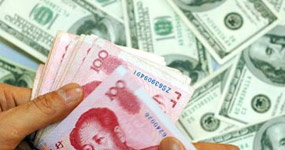
北京方面在自找麻烦。上周五,一名央行官员请美国不要将中国的汇率政策"政治化"。上周日,在全国人大年会的闭幕会上,中国总理温家宝却不言其他,尖锐地提到主导中美关系的三个以T字开头的问题:台湾、西藏、贸易盈余。不过,美方的反弹举动――130名国会议员联名敦促奥巴马总统将中国列为汇率操纵国(这将是16年来的首次)――似乎有点意气用事。这些议员必须认识到,不管是什么事,你对中国施加的压力越大,中国就越不可能照办。
美国的激愤是可以理解的。国际货币基金组织(IMF)的协定条款禁止一国为了取得不公平的贸易优势而操纵本国货币汇率,但中国并不向IMF借款,因此IMF无力迫使中国作出任何改变。与此同时,美国若要证明自己有理由实施贸易制裁,就必须说服世界贸易组织(WTO):汇率操纵符合该组织对"补贴"的严格定义,而且有理由针对这些补贴征收反补贴关税――这将是一个非常艰巨的任务。
中国上周作出的承诺,即"进一步推进人民币汇率形成机制的改革",是2008年7月人民币重新盯住美元以来,中国政府在汇率灵活性方面作出的最有力承诺。中信证券(Citic Securities)指出,这可能意味着,中国有意采取类似于新加坡的"篮子、区间、爬行"汇率政策,即参考一篮子外币(具体构成不对外透露)管理本币汇率,让其在一个确定的区间内浮动,在指定的时间框架内达到升值或贬值目标。若真是这样,那将是一大好事。与此同时,奥巴马政府不妨把公开表示人民币应当升值的话,留给巴西、俄罗斯和其它新兴市场国家去说。据中国国际金融有限公司(CICC)估算,今年中国向这些国家的出口将超过其对三大发达市场的出口。如果美国真的想让人民币升值,最佳的建议是闭上嘴巴,顺其自然。
Lex专栏是由FT评论员联合撰写的短评,对全球经济与商业进行精辟分析。
译者/和风
http://www.ftchinese.com/story/001031776

Beijing was asking for it. On Friday a central bank official invited the US to refrain from "politicising" China's currency policy. On Sunday, closing the annual meeting of lawmakers, Premier Wen did little else, with a series of pointed allusions to the "Three Ts" dominating the two nations' relationship: Taiwan, Tibet and the trade surplus. Still, the US retaliation � 130 Congressmen urging President Obama to label China a currency manipulator, for the first time in 16 years � is a rush of blood to the head. Signatories must realise that the more pressure you put on China to do anything, the less likely it is to do it.
America's exasperation is understandable. The International Monetary Fund's Articles of Agreement prohibit countries from manipulating their currency for the purpose of gaining an unfair trade advantage, but the IMF has no powers to force China, which does not borrow from it, to change anything. Trade sanctions, meanwhile, could be justified only if the US can persuade the World Trade Organisation that currency manipulation satisfies its narrow definition of a "subsidy," and that such subsidies merit countervailing duties � a very difficult task.
China's pledge last week to "further push ahead with reform of the renminbi exchange rate formation" was its strongest commitment to flexibility since the new dollar peg was put in place in July 2008. It may imply, notes Citic Securities, a desire to adopt a "basket, band and crawl" policy, similar to Singapore's, where the currency is managed against an undisclosed group of currencies, floating within a set band, to achieve a targeted appreciation or depreciation within a specified timeframe. If so, great. Meantime, the Obama administration should leave it to Brazil, Russia and other emerging nations � where China's shipments should overtake those to the three big developed markets this year, on CICC estimates � to make the argument for revaluation in public. If the US really wants a stronger renminbi, the best advice is to shut up, and let it happen.

没有评论:
发表评论